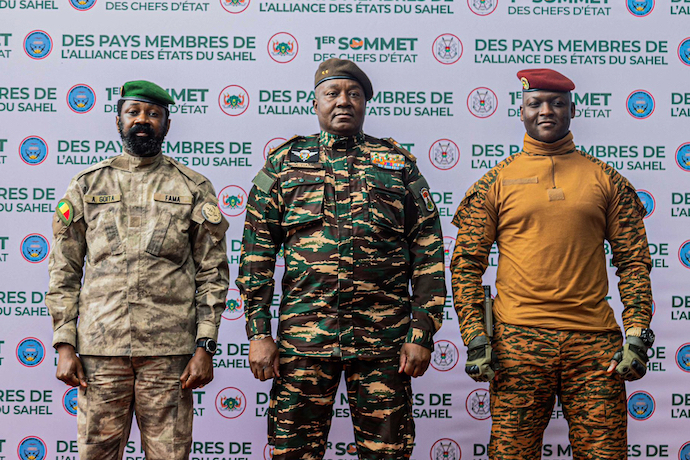
Niger, Mali, and Burkina Faso Have Broken Up with ECOWAS
In a significant geopolitical shift, the military leaders of Mali, Burkina Faso, and Niger have formally severed ties with the Economic Community of West African States (ECOWAS) to establish their own alliance. This move was solidified during a summit in Niamey, the capital of Niger, where the leaders signed a confederation treaty aimed at reinforcing their mutual defense pact, known as the Confederation of Sahel States.
This summit marked the first joint meeting of the three leaders since they came to power through successive coups in their neighboring West African nations. Niger’s Abdourahmane Tchiani, Burkina Faso’s Ibrahim Traoré, and Mali’s Assimi Goïta have now committed to a new path of regional cooperation.
ECOWAS had suspended the three countries following their respective military coups in August 2021 in Mali, September 2022 in Burkina Faso, and July 2023 in Niger. At the summit, Tchiani criticized ECOWAS, describing the 50-year-old organization as “a threat to our states.”
The leaders emphasized their decision to pursue greater integration through the new confederation, moving beyond ECOWAS and the G5 Sahel, which was established to combat regional Islamist groups. They accused the bloc, influenced by former colonial power France, of insufficiently supporting anti-jihadist efforts.

French troops withdrew from Mali in 2022 and from Niger and Burkina Faso last year, reflecting the strained relations. ECOWAS continues to grapple with widespread jihadist violence, financial instability, and the complex task of forming a regional force. Armed groups linked to al-Qaeda and ISIS have exploited these vulnerabilities, seeking control over territories and causing widespread violence and concern in Western capitals.
The Islamist insurgency in the Sahel, ongoing since 2014, has created a severe humanitarian crisis, affecting over 24 million people and displacing an estimated three million across the region. Burkina Faso alone witnessed a dramatic surge in violence in 2023, with more than 8,000 casualties, according to the Armed Conflict Location and Event Data Project.
In their speeches, the leaders pledged to strengthen their cooperation to combat jihadi groups. Tchiani declared the confederation the only effective regional grouping in the fight against terrorism, criticizing ECOWAS for its lack of involvement. Tchiani advocated for a “community free from the grip of foreign powers.”
“Our people have definitively turned away from ECOWAS,” Tchiani stated at the Sahel group meeting in Niamey on Saturday, rejecting the bloc’s appeals for reunification.
Traoré echoed these sentiments, accusing Western powers of exploiting their countries. He asserted that the era of Western dominance was over and emphasized the need for the countries to control their own resources and destinies. Goïta reinforced the alliance’s principle of collective defense, stating that an attack on one member would be considered an attack on all.
Notably, the alliance’s pivot away from Western allies includes developing partnerships with Russia and Iran. The leaders believe the confederation will enhance regional security through collaborative efforts in counterterrorism, joint military operations, intelligence sharing, and improved border security. This shift aims to reduce reliance on external powers, particularly France, and foster greater regional autonomy.
Economically, the confederation plans to leverage the combined resources and markets of its member states to drive development and manage the region’s vast natural resources more effectively. However, the alliance faces significant challenges. Its long-term success depends on addressing the root causes of instability, such as economic disparities and social tensions.
The international community’s response, particularly from Western powers, will be crucial. Support could bolster the confederation, while sanctions or isolation could undermine its efforts. The leaders’ ability to demonstrate that their governance is for the public good rather than personal gain will also be critical in shaping the alliance’s future.
As the confederation moves forward, its impact on the region and its interactions with global powers will be closely watched. The success of this new alliance could redefine the Sahel’s geopolitical landscape and influence broader regional dynamics.
